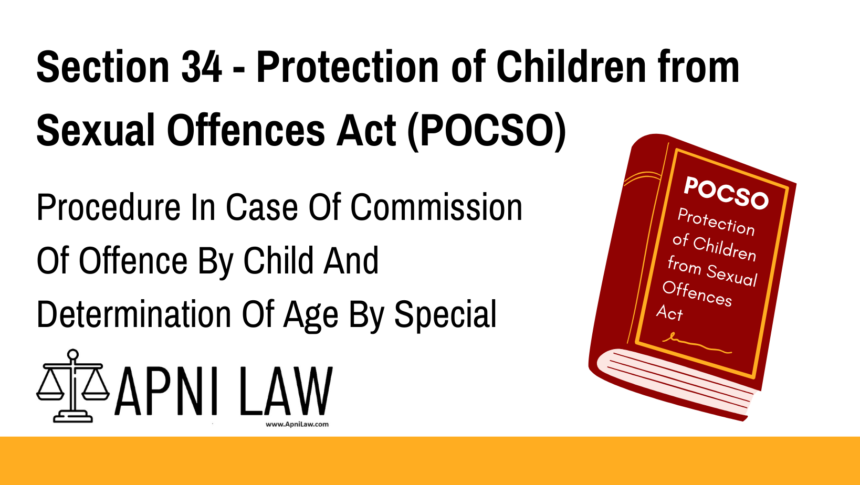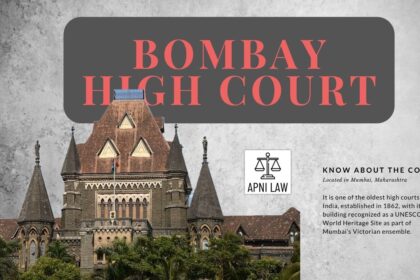Code: Section 34
(1) Where any offence under this Act is committed by a child, such child shall be dealt with under the provisions of 1[the Juvenile Justice (Care and Protection of Children) Act, 2015 (2 of 2016)].
(2) If any question arises in any proceeding before the Special Court whether a person is a child or not, such question shall be determined by the Special Court after satisfying itself about the age of such person and it shall record in writing its reasons for such determination.
(3) No order made by the Special Court shall be deemed to be invalid merely by any subsequent proof that the age of a personas determined by it under sub-section (2) was not the correct age of that person.
Explanation of Section 34 POCSO
Section 34 of the Protection of Children from Sexual Offences Act, 2012, outlines how offences under the Act committed by children should be handled. It also grants the Special Court the authority to determine whether an accused or party involved is a child, and lays down how such determinations affect the proceedings.
Key points of this section include:
- If a child commits a POCSO offence, the matter must be dealt with under the Juvenile Justice (Care and Protection of Children) Act, 2015.
- If a question arises regarding the age of a person involved in proceedings, the Special Court is empowered to determine the age and must provide written reasons for its finding.
- Even if later evidence proves the age determination was incorrect, the Court’s previous orders remain valid and are not invalidated.
This section ensures that juvenile offenders are treated according to their age and the special protections afforded to them under the juvenile justice framework.
Key Provisions
- Offenders who are minors are governed by the Juvenile Justice Act, not by regular trial procedures under the POCSO Act.
- The Special Court can independently determine whether an accused or victim is a child.
- Orders of the Court remain valid even if the age determination is later found to be incorrect.
Illustrations
Illustration 1: A Child Offender Under POCSO
A 16-year-old boy is accused of sexual misconduct under the POCSO Act. The Special Court determines his age based on school records and Aadhaar documents and decides he is a minor. His case is referred to the Juvenile Justice Board under the JJ Act, 2015.
Illustration 2: Dispute Over Age of Victim
During trial, the defense argues that the victim is above 18. The Special Court examines evidence such as birth certificates and academic records and concludes that the victim is 17. The court records its reasons in writing and proceeds with the case accordingly.
Illustration 3: Later Discovery of Incorrect Age
After the trial concludes, new evidence suggests that the accused was actually 18 at the time of the offence. However, the court’s judgment is not invalidated merely due to this revelation, as per Section 34(3).
Common Questions & Answers on Section 34 POCSO
1. What happens if a child commits a POCSO offence?
The child is dealt with under the Juvenile Justice (Care and Protection of Children) Act, 2015, not through regular criminal proceedings.
2. Who decides whether someone is a child or not during a POCSO trial?
The Special Court has the power to determine the age of any person involved and must record the reasoning in writing.
3. Is a court’s decision invalid if it incorrectly identifies a person’s age?
No. According to Section 34(3), the order remains valid even if it is later discovered that the age determination was incorrect.
4. What kind of evidence can the court use to determine age?
The court may rely on school records, Aadhaar cards, birth certificates, or medical examinations to determine a person’s age.
5. Does Section 34 apply only to accused individuals?
No. It applies to any person involved in proceedings under the POCSO Act, including victims, when age is in question.
Conclusion
Section 34 of the POCSO Act is an important safeguard ensuring that children accused of offences are treated in accordance with their age and maturity. It provides clear authority to the Special Court for determining age, while maintaining the validity of its decisions even in cases of later discovery of incorrect age assessments. This ensures procedural stability and protection of juvenile rights in line with the objectives of child-centric justice.
For more detailed legal interpretations and explanations of POCSO and other laws, visit ApniLaw – your reliable partner in understanding the law.








